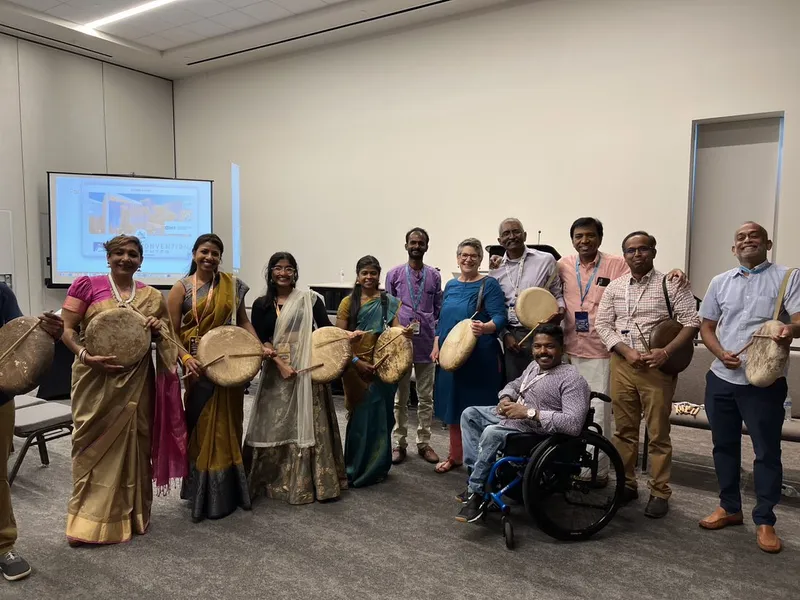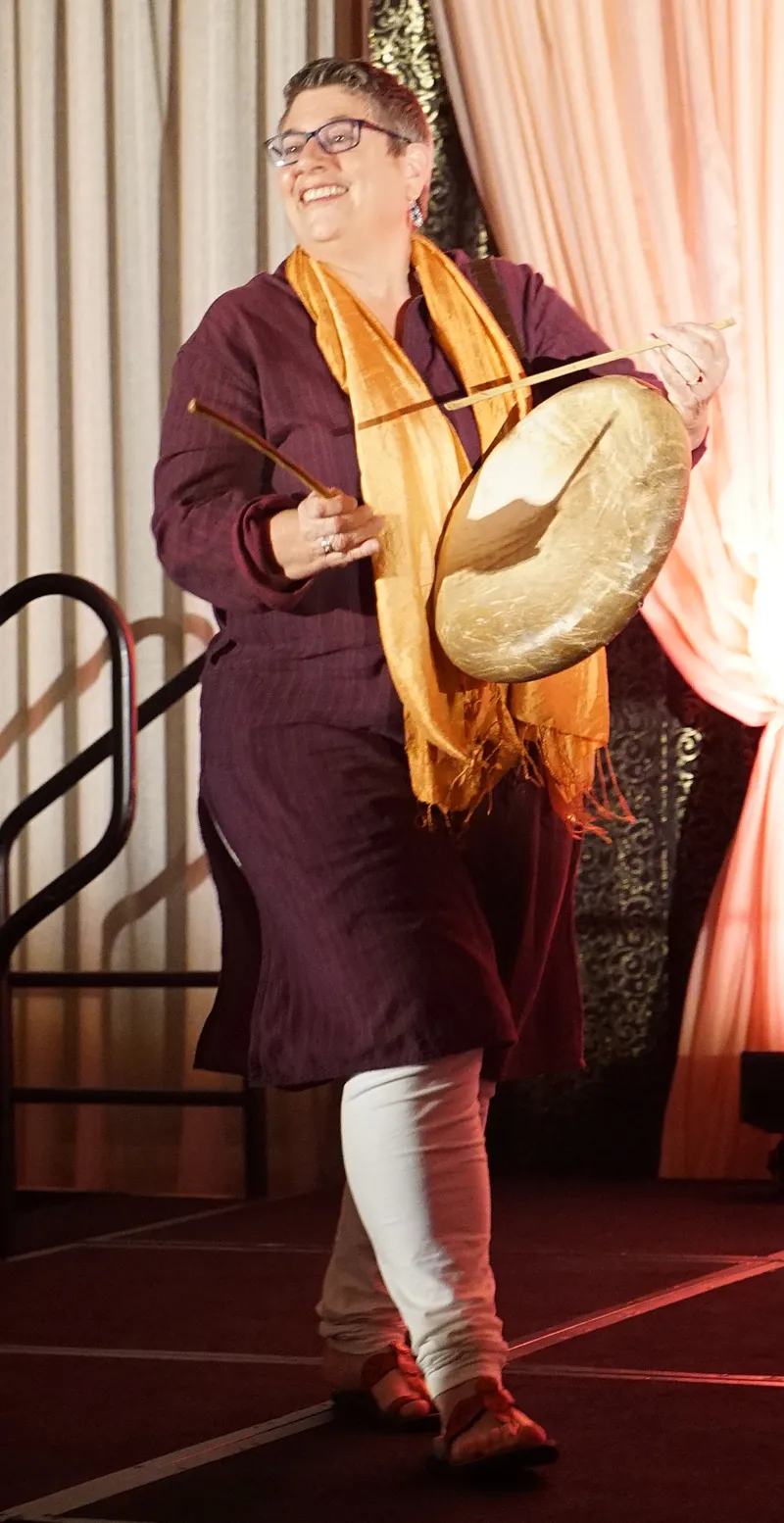This American professor is reviving Dalit folklore through ‘parai’
Zoe Sherinian, a professor of ethnomusicology at the University of Oklahoma, is an exemplary ‘parai’ exponent and teacher. She learnt the instrument first-hand from Dalit teachers and social justice leaders who revolutionised the instrument into a music of resistance.
The Federation of Tamil Sangams of North America (FeTNA) is a popular haunt for NRI Tamils to revisit their roots, celebrate the performing arts traditions of their homeland, and find a sense of community.
A figure central to these gatherings is an exuberant white woman and powerhouse percussionist named Zoe Sherinian, professor of Ethnomusicology at the University of Oklahoma, and a student and trainer of parai, a frame drum shaped percussion instrument from Tamil Nadu.
The Tamil diaspora has ‘sangams’ or community groups in each state in the US, and among them, several parai enthusiasts have evolved. Sherinian trains these groups in parai technique, history, and context. A majority of the members are IT sector employees, who hail from “middle caste roots”, she says.

Sherinian, who has authored a book and multiple articles on Dalit theology, teaches parai technique and history to the Tamil diaspora across United States.
This is significant for a number of reasons.
Three decades ago, Sherinian visited the Tamilnadu Theological Seminary (TTS) in Arasaradi, Madurai, where she studied church liturgy and theology, which was being delivered in the form of indigenous folk songs. As a Ph.D. student of ethnomusicology from Wesleyan University, Connecticut, this greatly intrigued Sherinian, as she studied with TTS’ professor, J. Theophilus Appavoo, who was revolutionising the church by introducing Tamil folk music, Dalit theology, and the parai into liturgy and hymnody.
“Missionaries and dominant caste Christians weren’t very appreciative of folk music,” says Sherinian. “Appavoo (who went on to become her teacher), was transforming the entire value system for oppressed people by reclaiming a musical tradition that was inherently theirs, and empowering them recreate their theology through it,” she adds.
From this research, Sherinian has authored a book and multiple articles on Dalit theology and the indigenisation of Tamil Christian Music. Translator Vaidehi Herbert’s research shows that the term ‘parai’ occurs 44 times in the ancient Sangam literature. And Sherinian is studying all these 44 incidents from a musicological perspective.
Studying with village parai group Kurinji Malar, she has mastered 35 adis or rhythmic patterns on the parai, which are unique to the occasions they are played for--baby showers, weddings, temple festivals, child naming ceremonies. This knowledge is key to the robust revival of the instrument, which so many urbanites believe to be solely associated with funeral music played by ensembles from Dalit communities.
“Recently, parai artist Asan A Manimaran and I studied the various contexts in which the instrument may have been used between the 7th and 17th centuries. We visited 12 Shiva and Murugan temples across Tamil Nadu and studied images of frame drums in sculptures and friezes, found particularly around the sanctum sanctorum. They appear to represent the parai or some version of it,” says Sherinian.
At 60, Sherinian is also a documentary filmmaker whose award-winning film, ‘Shakti Vibrations’ follows the women of the Sakthi Folk Cultural Centre in Dindugal and their complex campaign against gender, class, and caste oppression. These women have claimed a positive cultural identity through the parai, an instrument that Sherinian believes has empowered them to perform with confidence, and build community leadership to stand against regressive systems.
“I have screened the film at festivals across the world to highlight the intersections of casteism, sexism, and poverty, and how an instrument that was degraded for years along with its performers, is now the symbol of Dalit resistance,” says Sherinian.
Her book (in progress), ‘Drumming Our Liberation: The Spiritual, Cultural, and Sonic Power of the Parai Drum’, will document these developments and the politics of the instrument in Tamil Nadu and within the US diaspora.

Zoe has studied with the parai group Kurinji Malar and mastered 35 adis or rhythmic patterns on the drum, which are unique to occasions such as weddings, temple festivals, and child naming ceremonies. This is important for the cultural understanding of the instrument, which urbanites have associated only with funerals.
“My heart feels full that more people are learning the parai. I hope my classes are a safe space where anyone with an interest can learn the instrument,” says Sherinian.
But what concerns her is that most of the Tamils in America embrace the parai only as an ‘ancient Sangam era instrument’,’ without acknowledging the last 1,000 plus years of development of the art by hereditary performers under a caste system of untouchability. Further, in the diaspora, they have little awareness of the Dalit Arts Movement beginning in the early 1990s that folklorised the parai, took it from the village ritual ground, and put it on the stage as a performing arts tradition, she says.
Her work in recent years has been to get the hereditary parai asans--or teachers-- from Tamil Nadu to the United States to proliferate their knowledge first-hand to those wanting to learn the instrument and the folklore at large.
“The relative absence of hereditary parai drummers as respected teachers in the diaspora, is further “outcasting” their artistic knowledge and lived experiences in the traditional context. And this is something that I’d like to change,” she says.
Edited by Megha Reddy







